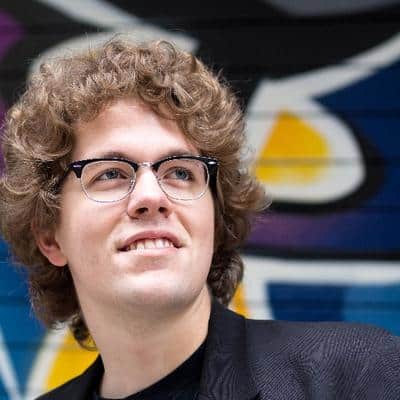Tapestry: We’re always interested in how composers joining us at LibLab got started in their careers as composers. When did you first know this might be your career path?
August: I started piano lessons when I was very young and I liked it but instead of practicing the pieces I was assigned I was fonder of noodling and making up my own stuff and just improvising. At some point people began saying to me that something was kind of good and I should write it down rather than just using my memory or improvising all the time. I liked that idea so I learned how to do that and had a fair number of pieces written down by the time I was just 7 or 8 years old. I just kept on doing that so that when it came time to think about going to university, it was natural to me to think that I’d focus on composition as my major in music school at University of Toronto.
Tapestry: And out of that, what drew you to opera?
August: This is kind of funny because I never really thought about opera until I saw the Rob Ford satirical opera at University of Toronto in the MacMillan Theatre. It made me see the potential of opera as satirical and contemporary. At the same time I needed to take one more course on my schedule so I added opera. Since then I have composed several small operas including one with my mother.
Tapestry: Can you tell us about your process?
August: In opera it is rather straight-forward. You have to start with the libretto. I like to take a deep dive into the libretto and ask a lot of questions before starting to compose, such as, “Is this funny or serious?”; “Is there a long pause here?” “What sorts of actions do you see happening on stage at this point?” and so on. Then I have to look at all of that and decide whether the piece needs several sound worlds to convey the different realities and moods the story inhabits. Conversely sometimes the piece is all in one sound world–like a meditation–and then the challenge is to create interest with variety or tell a story while staying in that same world.
Tapestry: What led you to apply to LibLab this year?
August: My story is probably simpler than some of the other participants. My mother, Colleen Murphy is one of the librettists participating (for a second time) this year. She first participated in 2005 and so it has been on my radar for more than 10 years. Once I began composing opera, I knew I wanted to come to LibLab and I thought about some projects specifically as being helpful in building my resume to help me get accepted to the program.
Tapestry: What do you hope to take away from LibLab for the future?
August: The relationships. I hope to work with some of the librettists and artists I have met here in the future. That would be great. I also hope that one of the pieces I started here or one of the partnerships will be the start of something that becomes a full-length work in future, that something large and meaningful will come out of this work.
Tapestry: Why do you think LibLab is important?
August: That’s simple to answer. There’s nothing else like it. Other opera companies do some opera development from time to time but there is no ongoing process like this. In fact I can’t think of any successful contemporary Canadian opera that didn’t have its start at LibLab in one way or another. All of them were not produced by Tapestry but either the creative team met at LibLab and started their working relationship there or the idea gelled at LibLab.
Tapestry: Did anything surprise you? Were your expectations different than your experience here?
August: Again, I had the benefit of having heard about the process from my mother, and also from other composers. However, although I was expecting intensity, I wasn’t totally prepared for exactly how intense it was going to be. I think I won the award for lack of sleep and I don’t not sleep as a fun activity! You really have to have good chops and all the tools in place to keep up with LibLab. There’s just no time for second-guessing, research or fixing mistakes. It’s good to test yourself this way and learn that you can trust your gut and compose successful things this quickly. It’s very useful in learning to trust your instincts.
